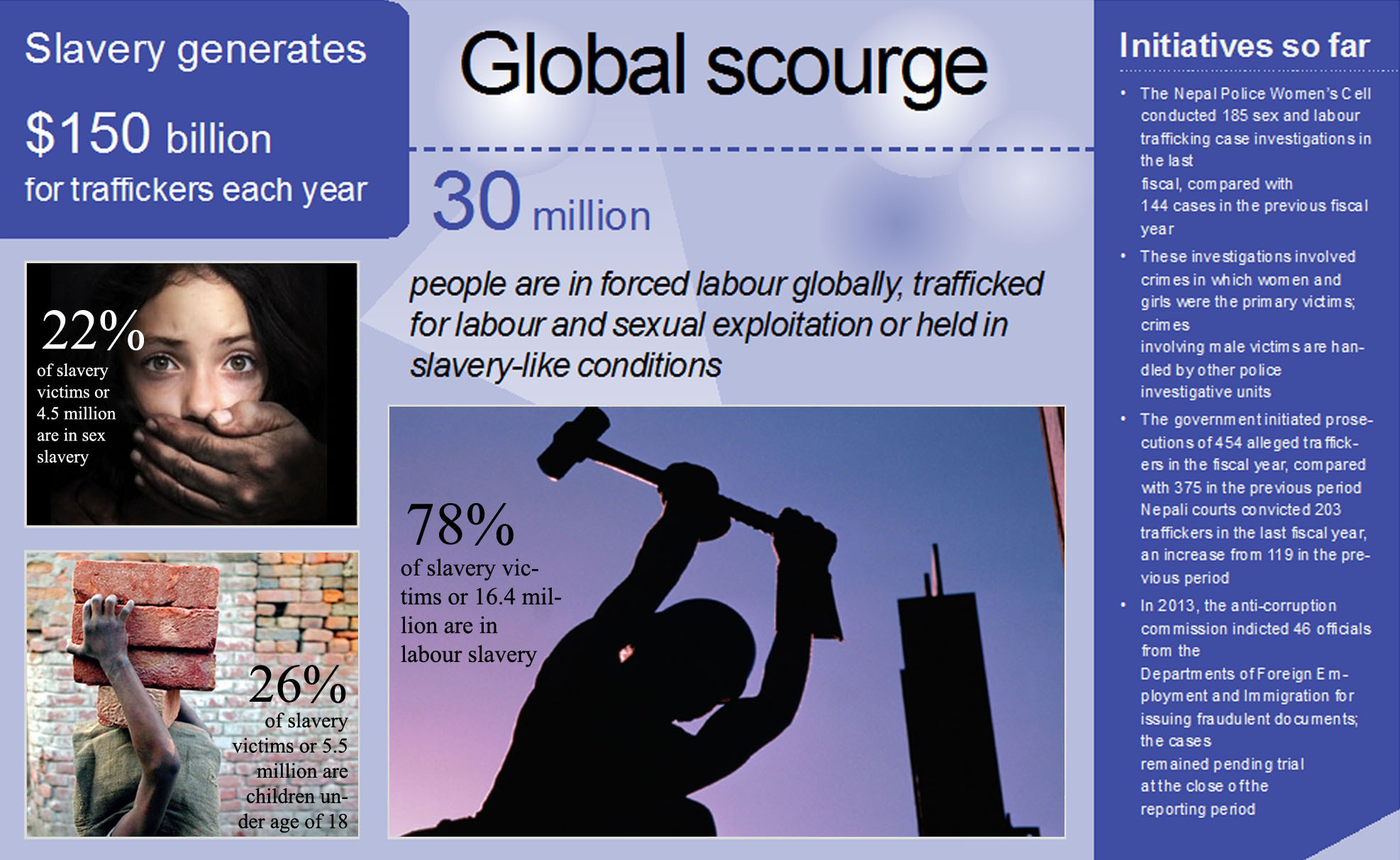Nepal needs to up efforts to fight trafficking
Kathmandu, July 28
The Government of Nepal does not fully comply with the minimum standards for the elimination of trafficking; however, it is making significant efforts to do so, according to Trafficking in Persons Report, 2015.
US Secretary of State John Kerry made public the report in Washington yesterday.
Nepali women and girls are subjected to sex trafficking in Nepal, India, the Middle East, Asia, and sub-Saharan Africa, says the report, adding Nepali men, women and children are subjected to forced labour in Nepal, India, the Middle East, Asia, and the United States for construction, factories, mines, domestic work, begging, and adult entertainment industry. The 15th annual TIP Report includes narratives of 188 countries and territories, including the United States.
This year’s report recognises that the Government of Nepal has made ‘progress through increased efforts to prevent human trafficking, as well as modest improvements in law enforcement efforts and efforts to protect victims’, with the prosecution of suspected trafficking offenders in 2014, resulting in 203 convictions.
According to the report, Nepal is a source, transit and destination country for men, women and children subjected to forced labour and sex trafficking. In many cases, this forced labour is facilitated by manpower agencies engaged in fraudulent recruitment and imposition of high fees. Unregistered migrants — including large number of Nepalis who travel through India or rely on unregistered recruiting agents — are particularly vulnerable to forced labour. Some migrants from Bangladesh and possibly other countries transit Nepal using falsified Nepali travel documents and may be subjected to human trafficking.
Some government officials are reportedly bribed to include false information in genuine Nepali passports or to provide fraudulent documents to prospective labour migrants, a tactic used by unscrupulous recruiters to evade recruitment regulations, says the report, adding Nepali and Indian children are subjected to forced labour in the country, especially in domestic work, brick kilns, and the embroidered textile, or zari, industry. Bonded labour exists in agriculture, brick kilns, the stone-breaking industry, and domestic work.
Discussing the report in Sindhupalchwok yesterday, US Ambassador Peter W Bodde said, “This report is important because it shows the need to speak up for adults and children who cannot voice their opinions regarding human trafficking.”
Reportedly, police sometimes detained trafficking victims and subsequently returned them to their traffickers in course of raids, highlights the report. “Victims frequently retracted their witness statements following alleged threats by traffickers. The government inconsistently implemented anti-trafficking laws while employing a narrow definition of human trafficking. Victims of sex trade and forced labour were only marginally protected, often leading to repeated victimisation.”
The report has recommended that Nepal increase law enforcement efforts against all forms of trafficking, including sex trafficking of Nepali females within Nepal, and against officials complicit in trafficking-related crimes, ensure victims are not punished for unlawful acts committed as a direct result of being subjected to trafficking, revise the Human Trafficking and Transportation (Control) Act, or draft new legislation to bring the definition of human trafficking in line with international law.
It has also asked Nepal to institute formal procedures to proactively identify trafficking victims and refer them to protection services respecting due process, prosecute suspected labour trafficking offenders and Nepali labour recruiters accused of charging excessive fees or engaging in fraudulent recruitment, lift current bans on migration for domestic work to discourage migration through undocumented channels, ensure victim services to both male and female victims of trafficking, and implement HTTCA victim protection provision while acceding to the 2000 UN TIP Protocol.






